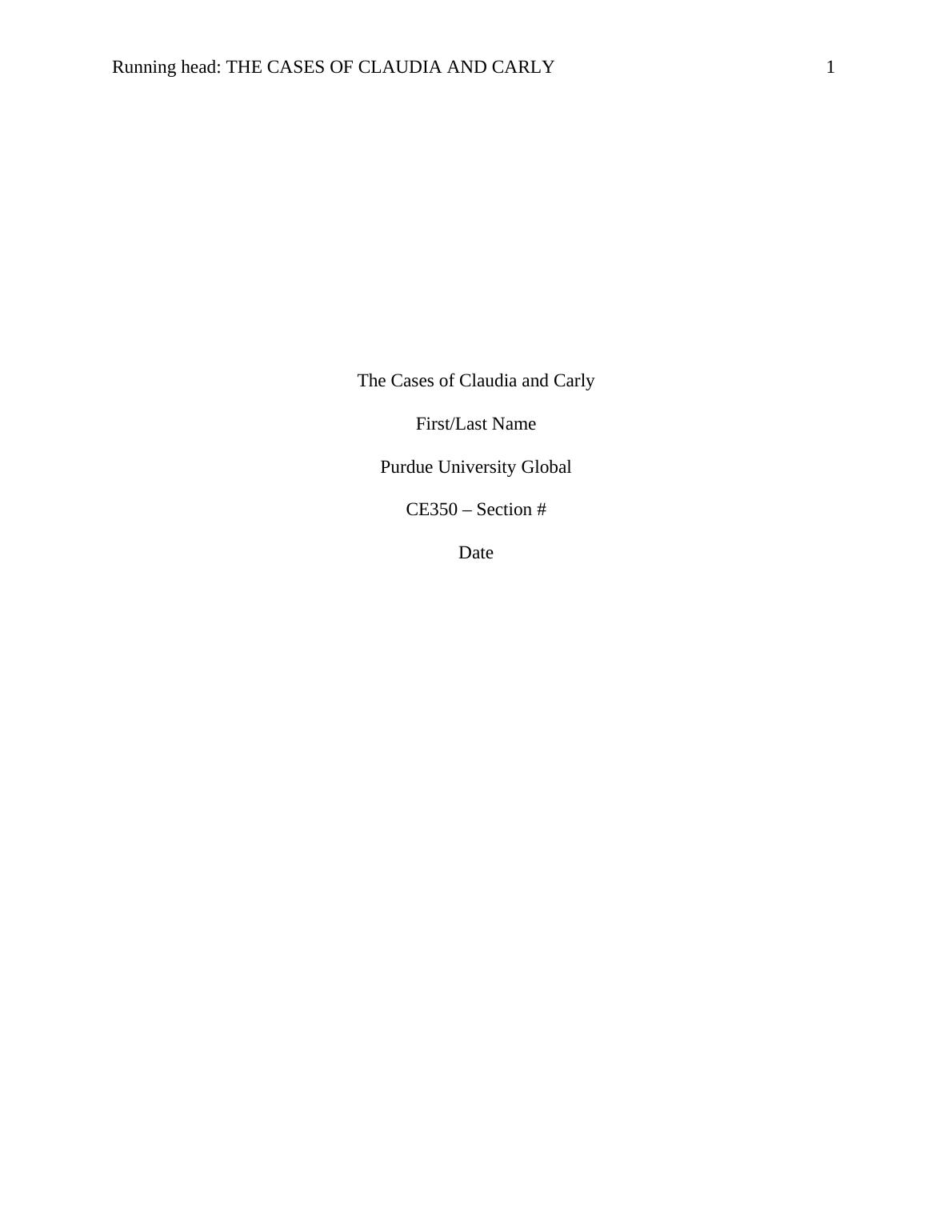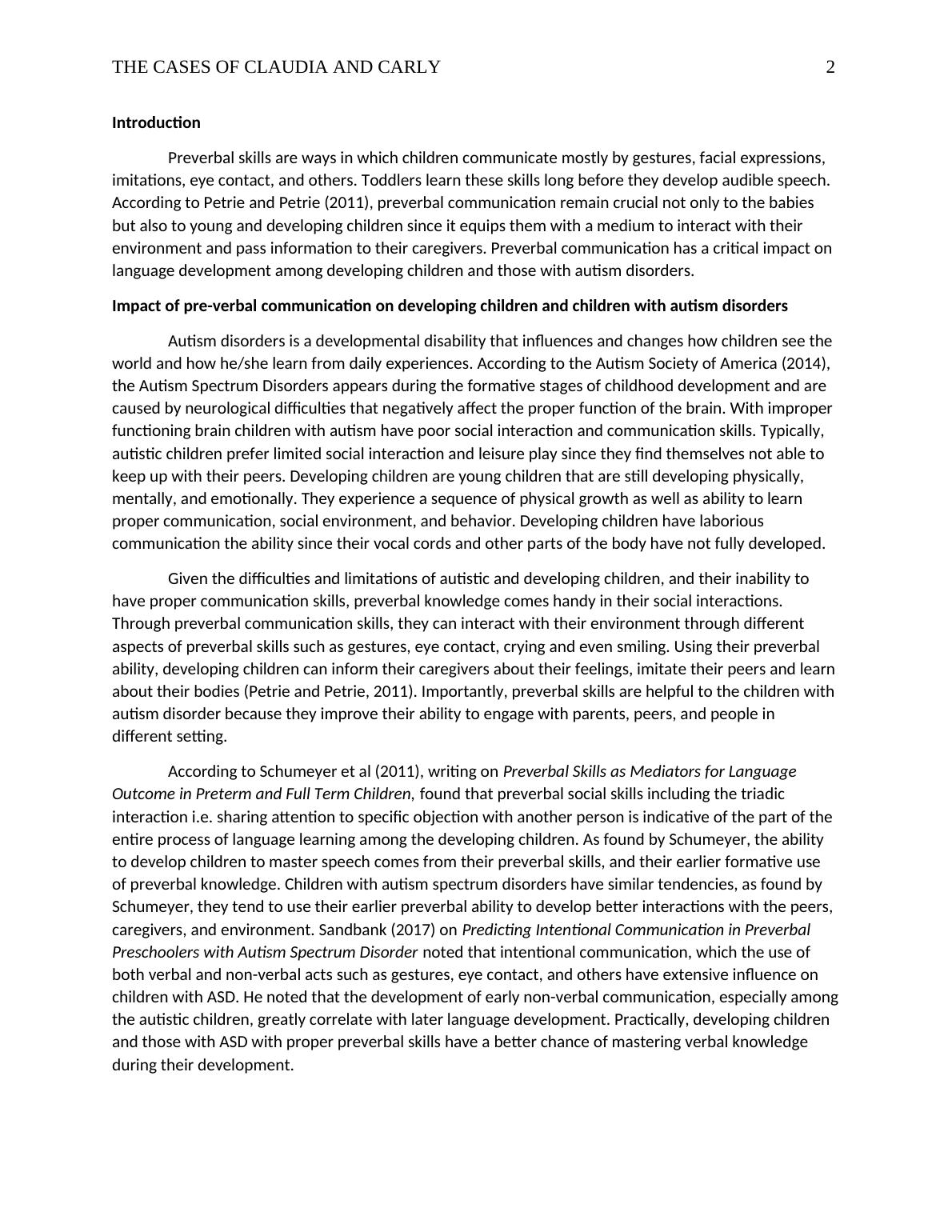Journal of Autism And Development Disorders
Added on 2022-09-18
4 Pages1087 Words19 Views
Running head: THE CASES OF CLAUDIA AND CARLY 1
The Cases of Claudia and Carly
First/Last Name
Purdue University Global
CE350 – Section #
Date
The Cases of Claudia and Carly
First/Last Name
Purdue University Global
CE350 – Section #
Date

THE CASES OF CLAUDIA AND CARLY 2
Introduction
Preverbal skills are ways in which children communicate mostly by gestures,
facial expressions, imitations, eye contact, and others. Toddlers learn these skills
long before they develop audible speech. According to Petrie and Petrie (2011),
preverbal communication remain crucial not only to the babies but also to young
and developing children since it equips them with a medium to interact with their
environment and pass information to their caregivers. Preverbal communication has
a critical impact on language development among developing children and those
with autism disorders.
Impact of pre-verbal communication on developing children and children
with autism disorders
Autism disorders is a developmental disability that influences and changes
how children see the world and how he/she learn from daily experiences. According
to the Autism Society of America (2014), the Autism Spectrum Disorders appears
during the formative stages of childhood development and are caused by
neurological difficulties that negatively affect the proper function of the brain. With
improper functioning brain children with autism have poor social interaction and
communication skills. Typically, autistic children prefer limited social interaction and
leisure play since they find themselves not able to keep up with their peers.
Developing children are young children that are still developing physically,
mentally, and emotionally. They experience a sequence of physical growth as well
as ability to learn proper communication, social environment, and behavior.
Developing children have laborious communication the ability since their vocal
cords and other parts of the body have not fully developed.
Given the difficulties and limitations of autistic and developing children, and
their inability to have proper communication skills, preverbal knowledge comes
handy in their social interactions. Through preverbal communication skills, they can
interact with their environment through different aspects of preverbal skills such as
gestures, eye contact, crying and even smiling. Using their preverbal ability,
developing children can inform their caregivers about their feelings, imitate their
peers and learn about their bodies (Petrie and Petrie, 2011). Importantly, preverbal
skills are helpful to the children with autism disorder because they improve their
ability to engage with parents, peers, and people in different setting.
According to Schumeyer et al (2011), writing on
Preverbal Skills as Mediators
for Language Outcome in Preterm and Full Term Children, found that preverbal
social skills including the triadic interaction i.e. sharing attention to specific
objection with another person is indicative of the part of the entire process of
language learning among the developing children. As found by Schumeyer, the
ability to develop children to master speech comes from their preverbal skills, and
their earlier formative use of preverbal knowledge. Children with autism spectrum
disorders have similar tendencies, as found by Schumeyer, they tend to use their
earlier preverbal ability to develop better interactions with the peers, caregivers,
and environment. Sandbank (2017) on
Predicting Intentional Communication in
Preverbal Preschoolers with Autism Spectrum Disorder noted that intentional
Introduction
Preverbal skills are ways in which children communicate mostly by gestures,
facial expressions, imitations, eye contact, and others. Toddlers learn these skills
long before they develop audible speech. According to Petrie and Petrie (2011),
preverbal communication remain crucial not only to the babies but also to young
and developing children since it equips them with a medium to interact with their
environment and pass information to their caregivers. Preverbal communication has
a critical impact on language development among developing children and those
with autism disorders.
Impact of pre-verbal communication on developing children and children
with autism disorders
Autism disorders is a developmental disability that influences and changes
how children see the world and how he/she learn from daily experiences. According
to the Autism Society of America (2014), the Autism Spectrum Disorders appears
during the formative stages of childhood development and are caused by
neurological difficulties that negatively affect the proper function of the brain. With
improper functioning brain children with autism have poor social interaction and
communication skills. Typically, autistic children prefer limited social interaction and
leisure play since they find themselves not able to keep up with their peers.
Developing children are young children that are still developing physically,
mentally, and emotionally. They experience a sequence of physical growth as well
as ability to learn proper communication, social environment, and behavior.
Developing children have laborious communication the ability since their vocal
cords and other parts of the body have not fully developed.
Given the difficulties and limitations of autistic and developing children, and
their inability to have proper communication skills, preverbal knowledge comes
handy in their social interactions. Through preverbal communication skills, they can
interact with their environment through different aspects of preverbal skills such as
gestures, eye contact, crying and even smiling. Using their preverbal ability,
developing children can inform their caregivers about their feelings, imitate their
peers and learn about their bodies (Petrie and Petrie, 2011). Importantly, preverbal
skills are helpful to the children with autism disorder because they improve their
ability to engage with parents, peers, and people in different setting.
According to Schumeyer et al (2011), writing on
Preverbal Skills as Mediators
for Language Outcome in Preterm and Full Term Children, found that preverbal
social skills including the triadic interaction i.e. sharing attention to specific
objection with another person is indicative of the part of the entire process of
language learning among the developing children. As found by Schumeyer, the
ability to develop children to master speech comes from their preverbal skills, and
their earlier formative use of preverbal knowledge. Children with autism spectrum
disorders have similar tendencies, as found by Schumeyer, they tend to use their
earlier preverbal ability to develop better interactions with the peers, caregivers,
and environment. Sandbank (2017) on
Predicting Intentional Communication in
Preverbal Preschoolers with Autism Spectrum Disorder noted that intentional

End of preview
Want to access all the pages? Upload your documents or become a member.
Related Documents
Assignment On Learning Disabilitylg...
|11
|2894
|20
Ways to Ensure Active Participation of Individuals with Autistic Spectrum Conditionslg...
|6
|932
|53
FACILATED COMMUNI-CATION IN TREATMENT OF AUTISM.lg...
|8
|409
|1
Language Acquisition - PDFlg...
|8
|2075
|104
The Center for Autism & Neurodevelopmentallg...
|8
|1572
|21
Autism and Learning Disability: Impact, Causes, and Strategieslg...
|9
|2322
|200
